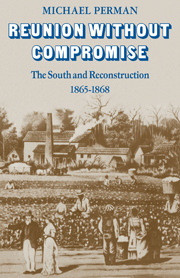Book contents
- Frontmatter
- Contents
- Preface
- Part I Conciliation and conflict
- Part 2 Encouraging Southern loyalty, 1865
- 2 The Provisional Governors
- 3 Strategies for readmission
- 4 Discretion decentralized
- 5 Misrepresentation
- Part 3 Seeking Southern cooperation, 1866
- Part 4 Demanding Southern acquiescence, 1867–1868
- Epilogue: The irrelevance of the moderates, 1865–1868
- Appendix: Registration and voting statistics for the Southern State Constitutional Conventions, 1867–8
- A note on sources
- Index
- Frontmatter
- Contents
- Preface
- Part I Conciliation and conflict
- Part 2 Encouraging Southern loyalty, 1865
- 2 The Provisional Governors
- 3 Strategies for readmission
- 4 Discretion decentralized
- 5 Misrepresentation
- Part 3 Seeking Southern cooperation, 1866
- Part 4 Demanding Southern acquiescence, 1867–1868
- Epilogue: The irrelevance of the moderates, 1865–1868
- Appendix: Registration and voting statistics for the Southern State Constitutional Conventions, 1867–8
- A note on sources
- Index
Summary
By the beginning of 1866 it was evident that a crisis had emerged in the political relations not merely between the President and Congress, but, more fundamentally, between the North and South. Misunderstanding, or breakdown in communications, cannot alone explain the failure of the President's attempt to forge a reunion of the sections by a policy of conciliation. Rather than misunderstanding, there was misrepresentation, both purposeful and unintended. Each section misrepresented, and was misrepresented by, the other. For it was the nature and composition of each section that were in dispute, not merely what each said and demanded. Differences of substance existed, and these were exacerbated by the political exigencies of the times as well as by the feelings of suspicion and recrimination which abounded on both sides of the Potomac.
From the point of view of the Southern politicians, there were three dimensions to this problem of misrepresentation. They were convinced, first of all, that the North, especially the radical Republicans, disliked and misunderstood Southerners and the South. To compound this, the Southerners felt that the Republicans proceeded deliberately to misrepresent Southern actions and inactions so as to justify harsher measures towards them. This was misrepresentation of the South.
- Type
- Chapter
- Information
- Reunion Without CompromiseThe South and Reconstruction: 1865–1868, pp. 144 - 182Publisher: Cambridge University PressPrint publication year: 1973

